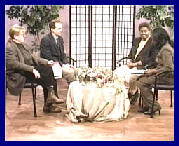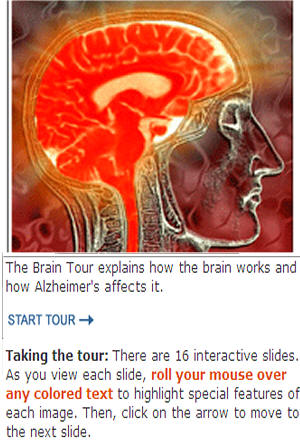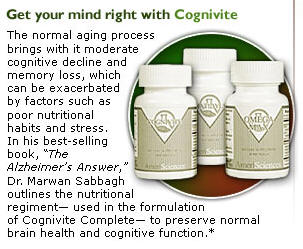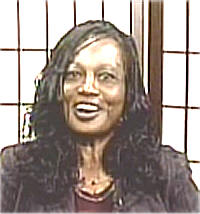| |
 Click here
- A must see!
Now click here to get the Click here
- A must see!
Now click here to get the
Watch our monthly
TV shows. We give information that Alzheimer's
care givers need to know.

We have
exciting
guests that can help you work with Alzheimer's
patients. You may get a copy of each TV program
free, you must pay for shipping, labeling and
handling, call 404-587-7933 for details.
Click
here for a preview of the show.
Alzheimer's
Care Giver Training is available. Call 404-587-7933
for prices and times.
A Quick History of the Disease
click here
Changes in Communication
People with
Alzheimer's disease may find it difficult at
times to express themselves in words. They may
also have trouble understanding the written or
spoken word. These changes can sometimes lead to
frustration and loneliness for both the person
with Alzheimer's disease and the care partner.
But it does not have to be that way. There are
many ways to communicate without words. In fact,
experts say that we communicate more frequently,
and often more meaningfully, with nonverbal
communication. A nod, a wink, a smile, or a hug
can speak volumes — and help us stay connected.
There are many steps we can take to change the
way we communicate so that we can still get our
message across.
|
What is Alzheimer's Disease?
Alzheimer's (AHLZ-high-merz)
is a disease that kills brains cells and is
fatal. It is the most common form of dementia,
which is a group of brain disorders that cause
confusion and problems with memory, thinking and
reasoning. We believe knowledge and
understanding of the illness is a key. this book
will help
This book is a must read. click the book to buy. click the author
Changes in Roles and Relationships
Alzheimer's disease may cause certain roles and
relationships in your life to change. For
example, as Alzheimer's disease progresses, the
care partner may be called upon to take more of
a leadership role than he or she might have been
accustomed to. And the person with Alzheimer's
disease may have to learn to accept help and
assistance, perhaps for the first time.
Adjusting to these changes can be difficult.
Fortunately, Alzheimer's disease can progress
very slowly, so in most cases you can make the
changes little by little. Flexibility is needed,
but that is the case for all successful
relationships. If you can remain flexible and
keep your partnership in mind, you are likely to
find new opportunities for shared meaning and
closeness.



If you have a loved one with Alzheimer's and has had a
problem with walking away and you would like to be on our TV show in Atlanta
call 404-587-7933 for details.
Contract for
commercial sponsorship--click
here
|

Click Above for
help with Alzheimer's |
If you have a
loved one with Alzheimer's and has had a problem
with wandering away
from home
and you would like to be on our TV show in
Atlanta call
404-587-7933
for details.

Maxine Funchess
We Have Classes in Alzheimer's Care Giving.
Click here to see
Alzheimer's is not a
mental illness or a part of normal aging. There
is no cure, and there is no single test to
diagnose it. Alzheimer's gets worse over time.
However, there are treatments and medications
available to help ease symptoms.
In
addition there are some important things that
Alzheimer's Patients care givers and loved ones
should do. To help protect the patient you
should consider signing up for one of our
classes.
|